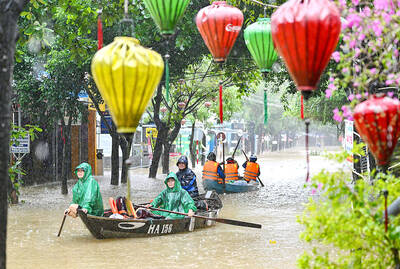New rules prohibiting foreigners from participating in the easing of public expression dampened enthusiasm ahead of the fourth birthday of Singapore's lone public soapbox.
The elimination of licensing requirements for indoor public talks and allowing more activities at the Speakers' Corner announced by Prime Minister Lee Hsien Loong take effect Sept. 1.
The date marks the anniversary of the venue opened four years ago in Hong Lim Green in downtown Singapore, but so shrouded in regulations it has been left a lonely park on many days.
Interest was reawakened when Lee, the son of Singapore's authoritative founding father Lee Kuan Yew, announced in his first major speech Aug. 22 that performances and exhibitions will be allowed at the corner, but will not be allowed to focus on race and religion.
It was part of a slew of changes aimed at creating a more open and diverse society in the notoriously strict city-state.
Under what police have now described as "refinements", the organizer and participants must be Singapore citizens and not have previously been barred for having flouted rules at the corner, Singapore's version of its namesake in London's Hyde Park.
Events can only be held between 7am and 7pm The organizer must register at the nearby neighborhood police post as speakers were required to do in the past, and either he or his agent must be present throughout the events.
Participants cannot carry placards or banners, use microphones, loud hailers or other sound amplification devices, and there cannot be any assembly or procession.
"The rationale for this condition is that there is a need to ensure that the event does not escalate into a demonstration or protest march," a police spokesman told The Straits Times.
While cautious, activists had lauded the easing of public speaking rules after Lee, 52, said, "It's a signal to speak, speak your voice, be heard, take responsibility for your views and opinions."
Police also defined indoor public talks as any lecture, address, debate, discussion or talk held in any enclosed space "and which is not within the hearing or view of any person who is not attending or participating."
"There was a lot of enthusiasm when Lee spoke of liberalization," said Chandra Mohan, a member of parliament and former president of the defunct Roundtable discussion group.
"But the rules now seem to be a bit restrictive and it's a dampener."
Critics noted the continued ban on microphones despite the traffic noise that made it difficult to be heard and the 7pm cutoff time was too early to attract many.
Several groups said they had no immediate plans to organize talks and exhibitions, but would consider collaborating with other volunteer groups.
Sinapan Samydorai, president of the Think Center, said he wants to invite government ministers to take part in events. Allowing for exhibitions and performances does send a signal that space for civil and political expression is widening, he added.
The center was allowed to hold doll displays last year depicting the plight of abused and neglected children after failing to secure police permission to do so at a busy mass transit station.
K.C. Tan has been an exception to the past apathy towards the corner, airing his views more than 200 times.
Disappointed by the failure to extend the hours to round-the-clock, he said he still plans to speak for 12 hours straight on Sept. 1.

With much pomp and circumstance, Cairo is today to inaugurate the long-awaited Grand Egyptian Museum (GEM), widely presented as the crowning jewel on authorities’ efforts to overhaul the country’s vital tourism industry. With a panoramic view of the Giza pyramids plateau, the museum houses thousands of artifacts spanning more than 5,000 years of Egyptian antiquity at a whopping cost of more than US$1 billion. More than two decades in the making, the ultra-modern museum anticipates 5 million visitors annually, with never-before-seen relics on display. In the run-up to the grand opening, Egyptian media and official statements have hailed the “historic moment,” describing the

‘CHILD PORNOGRAPHY’: The doll on Shein’s Web site measure about 80cm in height, and it was holding a teddy bear in a photo published by a daily newspaper France’s anti-fraud unit on Saturday said it had reported Asian e-commerce giant Shein (希音) for selling what it described as “sex dolls with a childlike appearance.” The French Directorate General for Competition, Consumer Affairs and Fraud Control (DGCCRF) said in a statement that the “description and categorization” of the items on Shein’s Web site “make it difficult to doubt the child pornography nature of the content.” Shortly after the statement, Shein announced that the dolls in question had been withdrawn from its platform and that it had launched an internal inquiry. On its Web site, Le Parisien daily published a

UNCERTAIN TOLLS: Images on social media showed small protests that escalated, with reports of police shooting live rounds as polling stations were targeted Tanzania yesterday was on lockdown with a communications blackout, a day after elections turned into violent chaos with unconfirmed reports of many dead. Tanzanian President Samia Suluhu Hassan had sought to solidify her position and silence criticism within her party in the virtually uncontested polls, with the main challengers either jailed or disqualified. In the run-up, rights groups condemned a “wave of terror” in the east African nation, which has seen a string of high-profile abductions that ramped up in the final days. A heavy security presence on Wednesday failed to deter hundreds protesting in economic hub Dar es Salaam and elsewhere, some

Flooding in Vietnam has killed at least 10 people this week as the water level of a major river near tourist landmarks reached a 60-year high, authorities said yesterday. Vietnam’s coastal provinces, home to UNESCO world heritage site Hoi An ancient town, have been pummeled by heavy rain since the weekend, with a record of up to 1.7m falling over 24 hours. At least 10 people have been killed, while eight others are missing, the Vietnamese Ministry of Natural Resources and Environment said. More than 128,000 houses in five central provinces have been inundated, with water 3m deep in some areas. People waded through